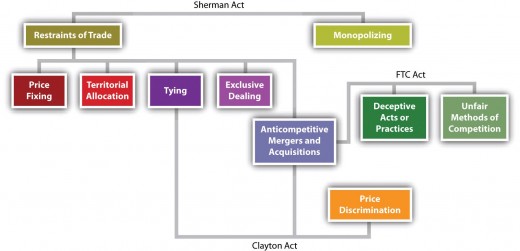We Have Anti-Monopoly Laws to Deal With Google and FB

Introduction
Recent revelations of abuse of personal data at Facebook is troubling. Some have proposed new regulations to oversee these new socal media companies. Why? We already have anti monopoly laws on the books. These companies needs to be broken up so that they do not have the dominance they possess.
- Apr. 2018
Background
What is a monopoly? And why is it bad? The Sherman anti-trust Act was passed in 1890, over 100 years ago. The reason then was some companies have gotten too large and dominent such that a few of them colluded to price fix and gouge their customers. This was later enhanced In 1914 when Congress passed the Clayton Act, which prohibited specific business actions (such as price discrimination and tying) if they substantially lessened competition. At the same time Congress established the Federal Trade Commission (FTC), whose legal and business experts could force business to agree to "consent decrees", which provided an alternative mechanism to police antitrust.
I worked for a large computer company called IBM from 1974 till 2002. IBM was the target of a government consent decree since the 1950s. It finally ended in 1996 after 40 years of legal wrangling.
Some Parallels...
It is good to review some parallel aspects of IBM in the 1970-80 period and Facebook in the recent 2010 era.
They were both dominent in their industry. There were other smaller computer companies as there are other social media applications however the biggest and dominant by shear size is IBM computers and FB social media application.
Both made tons of money for themselves and for their stock holders.
There market capitalization is among the top 10 in the world.
There brand is well known to the average consumer and part of their value as a company is the “good will“ of their brand.
The company image of both companies were well managed. They are known as social and environmental conscience companies.
They were both innovative and created products people wanted. The IBM PC for example and the FB app.
Some Additional Info...
When any company becomes so big, and a money maker, they also become arrogant and over confident and feel entitled. They are able to charge whatever the market will bear and take the attitude we know best... The users are secondary and their concerns are not treated with respect. This is when a government need to step in. A company growing too large, too fast and not responsive to their customers. It is especially troubling when they charge excessive fees or bundle some software in a way to discourge competition. IBM is by no means the only one doing this. It happened at AT&T and Microsoft and other companies where their dominance is too great and they face little or no competition.
Too Big To Fail...
The simple answer to the problem of too big to fail...is to break them up. No companies should be allowed to become so big, that they dominate an industry. This applies to banking, energy, computers,media, and the internet or social media. Monopolies are just that, too large to fail. In addition, they are too large to be competitive or respinsive. They are not playing by the same rules that govern the rest of society.
I would support a stronger SEC where they should intervene in large companies buying up other companies... Money made by a company should go to the stockholders or invest back into the business. They are not to be used to parked over seas or used to buy other companies. Simple rule.
Capitalism is the use of assets for investment and growth not to sit idle or buy existing competitiors.
Summary
The laws against monopoly are well founded and tested. In order for a free enterprise system to work, we need to keep the playing field level. It is the job of our government agencies such as the SEC to see to it that companies do not become too dominant. The laws already exist to prevent mergers and acquisition of one company by a rival when the result will lead to less competition and a possible monopoly.
In the current climate, some successful companies such as Google, Apple, Microsoft, and Facebook and Amazon all are potential targets for anti-trust actions. They hire lobbies and influence our government policies to curry favor to lower their taxes at the expense of the taxpayers and citizens.
We don’t need additional legislation to deal with this. We just have to act in the interest of the general public.
Sometimes, too big is not the answer. In the case of banking, as we learned the hard way, we don’t want companies or banks that become “too big to fail.” When they do, the rest of us are stuck with a huge bailout.
Some Related Info
- IBM Reaches Settlement To End Consent Decree - WSJ
IBM reached a settlement with the U.S. Justice Department to end the consent decree that for 40 years has restricted how it sells and services computers. - Sherman Antitrust Act - Wikipedia
© 2018 Jack Lee



